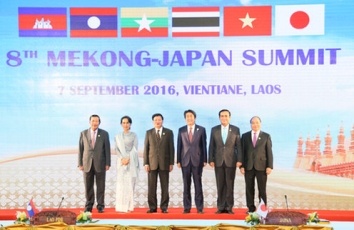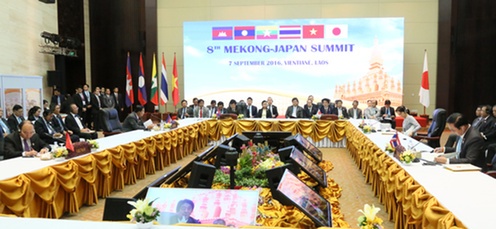Asia
The Eighth Mekong-Japan Summit Meeting
September 7, 2016
 Photo: Cabinet Public Relations Office
Photo: Cabinet Public Relations Office
 Photo: Cabinet Public Relations Office
Photo: Cabinet Public Relations Office
On September 7, commencing at 8:15 p.m. (local time) for approximately 45 minutes, the Eighth Mekong-Japan Summit Meeting (the Mekong-Japan Summit) was held in Vientiane (Laos). The Summit was attended by Mr. Shinzo Abe, Prime Minister of Japan, and co-chaired with Laos. The overview is as follows. Other attendees were H.E. Dr. Thongloun Sisoulith (co-chair), Prime Minister of the Lao People's Democratic Republic, H.E. Mr. Samdech Akka Moha Sena Padei Techo Hun Sen, Prime Minister of the Kingdom of Cambodia, H.E. Ms. Aung San Suu Kyi, State Counselor of the Republic of the Union of Myanmar, H.E. Mr. Prayut Chan-o-cha, Prime Minister of the Kingdom of Thailand, and H.E. Mr. Nguyen Xuan Phuc, Prime Minister of the Socialist Republic of Viet Nam). The meeting issued a list of projects to be prioritized under the Japan-Mekong Connectivity Initiative.
1 Opening Remarks
(1)Co-chair Prime Minister Thongloun expressed pleasure at having the opportunity to host the meeting together with Prime Minister Abe, expressed his appreciation to the Japanese Government and Japanese people for Japan-Mekong cooperation that has resulted in adoption of the "New Tokyo Strategy 2015 for Mekong-Japan Cooperation," the "Japan-Mekong Action Plan" (below, Action Plan), and other initiatives since the forum was launched in 2009, and that provided specific results in infrastructure development and human resource training, expressing its intention to focus on strengthening cooperation.
(2)Prime Minister Abe emphasized that bolstering the resilience of the ASEAN economy, which constitutes a massive market of 600 million people, is a vital issue amid growing downside risk for the global economy outlook, that growth by the Mekong region with rich potential is important, and that Japan intends to supply longer-term risk money for the development of quality infrastructure and hopes to contribute to lifting the Mekong region's GDP by 20 billion dollars by 2020, as proposed in the Mekong Industrial Development Vision, including through the Initiative for Quality Infrastructure Expansion that aims to provide about 200 billion dollars over five years.
(2)Prime Minister Abe emphasized that bolstering the resilience of the ASEAN economy, which constitutes a massive market of 600 million people, is a vital issue amid growing downside risk for the global economy outlook, that growth by the Mekong region with rich potential is important, and that Japan intends to supply longer-term risk money for the development of quality infrastructure and hopes to contribute to lifting the Mekong region's GDP by 20 billion dollars by 2020, as proposed in the Mekong Industrial Development Vision, including through the Initiative for Quality Infrastructure Expansion that aims to provide about 200 billion dollars over five years.
2 Japan-Mekong Cooperation
(1) Prime Minister Abe offered the following comments on Japan-Mekong cooperation.
- The efforts on hardware connectivity, the first pillar of the New Tokyo Strategy 2015, have been accelerated. Japan has already pledged over one-third of the 750 billion yen in planned assistance over three years from April 2016, the first year. Japan welcomes that together with the Mekong countries, it has completed a list of prioritized ODA projects through the Japan-Mekong Connectivity Initiative taking note of the Action Plan, Mekong Industrial Development Vision, and Work Program formulated with Mekong countries. This Initiative aims to support realization of "vibrant connectivity."
- The number of Japanese companies entering the Mekong region has risen sharply in recent years. In order to expand investments, it is vital to create environments that benefit investors. Mekong countries need to prepare legal frameworks that help companies conduct continuous investments with peace of mind. Japan expects such initiatives made by each country's effort.
- On the soft front, Japan implements effective initiatives to address human resources needs by each country through the Industrial Human Resource Development Cooperation Initiative. Furthermore, Japan plans to accept a total of 1,000 foreign students from Asian developing countries over five years from fiscal 2017 under the "Innovative Asia" program. Master's course of Vietnam-Japan University will be established this week, and Japan hopes to strengthen training of advanced human resources for the next generation.
- Japan-Cambodia Air Services Agreement and Japan-Laos Air Services Agreement entered into force. Japan welcomes the launching of a direct flight between Phnom Penh and Narita last week and is looking forward to further interaction among people.
- To expand Japan's sophisticated medical technologies globally, Japan plans to offer seminars for local doctors, nurses, and other medical staff and to promote basic research on infectious diseases.
- Readiness for natural disasters and sustainable utilization of water resources are vital issues for the Mekong region. Japan will hold High School Students Summit on World Tsunami Awareness Day in Kuroshio in November 2016 with the aim of boosting disaster prevention capabilities in various countries. Weak infrastructure ultimately impedes growth. Japan believes it is important to deploy "quality infrastructure" in the Mekong region from this perspective. It intends to start a survey to prepare a program that contributes to environmental conservation, and particularly protection of forest resources, in the Mekong River basin area.
- Mekong countries welcome progress in Japan-Mekong cooperation. Assistance from Japan to the Mekong region contributes to social and economic advancements in the area, and the region's countries offer heartfelt appreciation to the Japanese people and Japanese Government. Foreign Minister and Economic Minister meetings adopted important documents over the past year - Action Plan, Mekong Industrial Development Vision, and Work Program.
- Assistance based on the three pillars of the New Tokyo Strategy 2015 should contribute to sustainable development. The Mekong region has strong potential. Japan-Mekong cooperation is enabling smooth integration through social and economic advancement in Mekong countries and the entire region and rectification of discrepancies in the Mekong area. This is the inaugural year for the ASEAN Community, and Japan-Mekong cooperation benefits ASEAN economic integration.
- Mekong countries appreciate the development of quality infrastructure for the overall Mekong region under the New Tokyo Strategy 2015 and Action Plan. They also support the Japan-Mekong Connectivity Initiative established at this year's Mekong-Japan Foreign Ministers' Meeting. They welcome deeper discussions in each corridor thanks to holding senior-level working group meetings as well as the conclusion of a JICA and NEDA partnership agreement in July 2016. They hope that the initiative will lead to results in a wide range of areas and bolster connectivity in trade investments, sea, air, ground, and digital aspects, and other areas. They look forward to expansion of people interactions following the commencement of a direct flight between Narita and Phnom Penh on September 1.
- The Mekong countries want to cooperate with Japan in economic activities. Furthermore, they hope to strengthen promotion of investments and trade. Roughly 1,000 Japanese companies started businesses in the Mekong area over the past three years and are creating job opportunities. They appreciate assistance for smaller companies.
- The Mekong countries support the Initiative on Industrial Human Resource Training and Cooperation. Human resource training reinforces physical connectivity. The Vietnam-Japan University is the type of cooperation that deserves special mention.
- Empowerment of women is important in addressing a variety of social issues. The Mekong countries welcome establishment of the Japan-ASEAN Women Empowerment Fund. It is also important to tackle issues related to a new lifestyle format and health that becomes an issue in aging.
- Natural disasters are a pressing issue for the Mekong region. It is important to build societies with food security and resilience to climate change and disasters. The Mekong countries aim to cooperate in areas of electricity and finding solutions for water shortages. Cooperation toward agricultural advancement is important too. The Mekong countries aim to promote sustainable development through the mechanism of the Green Mekong Forum co-hosted by Thailand and Japan in June 2016.
3 Regional and Global Affairs
Prime Minister Abe commented that regional peace and stability are essential for the further growth and advancement by the Mekong region, that Japan intends to continue contributing to regional peace and prosperity under its policy of "Proactive Contribution to Peace" based on the principle of international cooperation, including its "Legislation for Security and Peace," and that it welcomed peaceful implementation of Myanmar's general election in November 2015 and Thailand's national referendum on the draft of a new Constitution, in this regard. Participating countries expressed support for all types of measures that contribute to peace and stability based on mutual understanding and trust. Discussion on the regional issues, including various concerns about the South China Sea and North Korea also took place.


 (263KB)
(263KB)